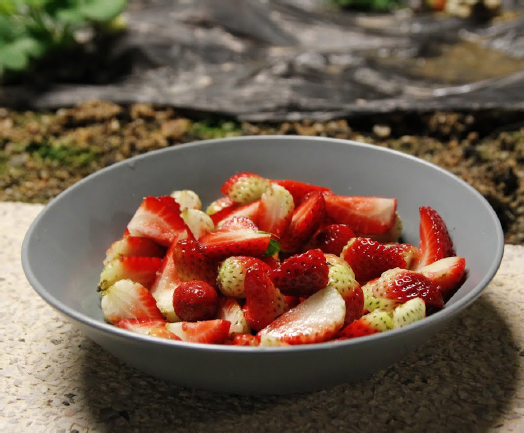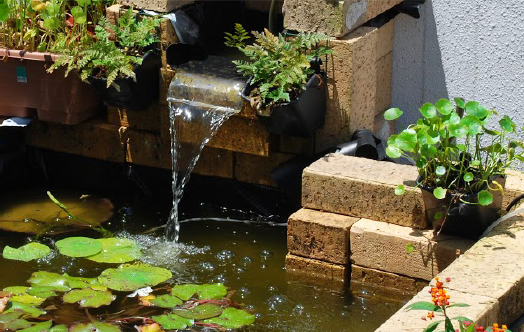
Gardens of Delight at CUHK
Almost everyone who has been to the Chinese University knows there are organic gardens on the campus. The long-standing scarecrow-guarded ones behind Adam Schall Residence at United College, and outside Chih Hsing Hall at New Asia College are no stranger to many. But these are far from being the only vegetable gardens at CUHK. A number have cropped up relatively recently, and if you were a bird, you'd know this as many sit on the roofs of buildings.
University Library
The organic vegetable garden with killer views atop the University Library Extension grows an impressive range of herbs as well as vegetables such as gourd, bush bean, cucumber, radish, corn, lettuce and tomato. The library works closely with two organizations, O-Farm and the Permaculture Institute, to offer training and support to a team of 20 library staff who take care of the garden. Training sessions will be run every few months to nurture more gardeners among the staff.
Vegetable growing is of course fun, healthy, and green, but for Ms. Louis Jones, University Librarian, it's much more than that. 'The library's organic roof-top garden is a catalyst for team building, skills development and fostering staff morale. The gardeners, who may rarely meet during their daily work, are getting to know one another better. They are learning together, and learning from each other; in the vegetable garden a more junior member of staff may be the most experienced gardener and the senior staff a novice. The garden is softening our hierarchical thinking and all the gardeners are receiving "training the trainer" coaching with generous support from the CC Wu Cultural & Education Foundation Fund. It's a skill we all need in our work.'
Ms. Jones said she used to grow organic vegetables back home in England, digging heavy clay soil and battling slugs and other pests. 'Rooftop vegetable gardening in Hong Kong is a wonder for me, not just seeing vegetables I could never grow in the UK but how quickly crops are ready to harvest. The vegetables look so appetizing and well cared for, but it is the gardeners' enthusiasm that I take delight in.'

Aquaponics at Shaw
Shaw College is carrying out an aquaponics project on the roof of Kuo Mou Hall called Shawquaponics. Aquaponics is a food production system that combines aquaculture with hydrophonics. Aquaculture is the farming of fish, shrimp, and aquatic plants; hydrophonics is the growing of plants in water, using nutrient-rich solutions, without soil. Combining the two into a symbiotic system turns the drawbacks of each into strengths.
In an aquaphonics system, water rich in excretion from the aquatic organisms being raised is circulated to the hydrophonics section, where it is broken down by nitrification bacteria into nitrates and nitrites. These are subsequently absorbed by the plants as fertilizer. If left to accumulate in the water, this excretion can increase the water's toxicity; if discharged, it can cause pollution. Clean water is then circulated back to the fish tank.

Jason Kwan, Year 4 Nursing student, says caring for Shawquaponics has been life-changing for him. Not only that, the gratification he gains from caring for aquatic organisms is comparable to that from caring for patients in the hospital. 'It gives me tremendous joy to be able to develop a deep relationship with fish and plants in a way I cannot with my patients because the latter leave after a period of time. When a fish died from liver complications, I buried it myself. Part of our job has been to get rid of pests. One night, I spotted a caterpillar, picked it up with a pair of chopsticks and flung it into the tank where it was snapped up by a fish. I was relieved, then it struck me that I had just killed a life. This incident made me realize that everything we do, whether it's urban development or building a third runway, has an impact on other living creatures.'
Jason is thankful to CUHK for providing him with an environment that's conducive to lessons about life and death. 'I've trained in the gym with a monkey staring at me. I've spotted porcupines on campus, squirrels tree-hopping while I waited for the school bus. You know that quote by J.R.R. Tolkien, "All have their worth and each contributes to the worth of others."'
Wu Yee Sun College
There are two rooftop gardens at Wu Yee Sun College, one on top of each block. They are attended to by six or seven student volunteers (some being members of the WYS Green Team) who not only engage in cultivation but also in laying the groundwork. One of the volunteers, Li Tsz-kin, said, 'Although the college buildings came designed with rooftop gardens, the soil from the construction company was of a poor quality comparable to construction waste. With advice from Prof. Kwai-cheong Chau, Chairman of College Campus Environment Committee, we spent two months growing sun hemp for green manure, then burying it to enrich the soil.'
The team has shared their farming experiences with other students and distributed cherry tomatoes, strawberries and other crops in the lobby. Lettuce from the garden has also been served in salads at the College canteen. 'People are amazed at how flavourful our homegrown cherry tomatoes are,' observed Tsz-kin. The team plans to invite other CUHK students to visit the gardens next year.


Lee Woo Sing College
Lee Woo Sing College has two attractive rooftop planting areas and a nursery, that grow flowers, vegetables and herbs cared for by students of the college. The College recruits an expert from the Agriculture and Fisheries Department who experiments with different species to see which ones are most suitable for the venues. Twice a year, the College hires an instructor from the Produce Green Foundation to teach a class of 20 students the basics of urban farming. So far about 20 to 30 of these Green Life Ambassadors have been involved in the College's farming activities. Food harvested is sold in the courtyard on 'Green Woo Sing Day', a green fair event that's open to all staff and students of the University. Leafy vegetables are also used as ingredients for the Vegetarian Hotpot, a highlight of the Vegetarian Week event.
Other Locations and Events
Atop the Hui Yeung Shing Building on Chung Chi campus, staff of the University General Education Programme grow herbs, ginger, tomatoes and aloe in pots, alongside plots where Prof. Derek Lai of the Department of Geography and Resource Management carries out turf experiments. The School of Chinese Medicine operates several herbal gardens, the largest of which lies along the scenic 'Alumni Trail'. The 20,000 sq ft garden is home to over 500 species of herbs that both serve to educate and as subjects for academic research.
Besides these, the student organization, the CUHK Agricultural Development Group, organizes farm- and farming-related events. A highlight is 'Agricultural Week' which features film screening and talks by farmers of the local green movement, and a tour of farms on campus.
And of course, the University's Estates Management Office works hard to take care of all the landscaping works on our beautiful 137.7-hectare campus all year round.


